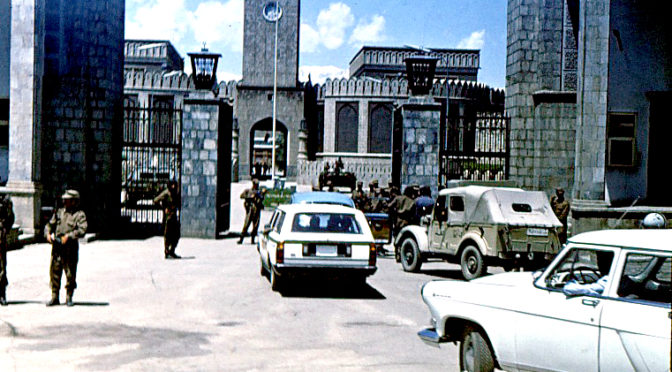UNITED NATIONS, September 12. /TASS/. Afghanistan will be represented by Ghulam Isaczai, the current ambassador to the United Nations, at the upcoming high-level week at the UN General Assembly which will be held on September 21-27, a UN source told TASS on Saturday.
Monthly Archives: September 2021
What Life In Afghanistan Will Be Like Under Taliban Rule
NPR’s Lulu Garcia-Navarro speaks with the Kathy Gannon of the Associated Press about what she’s witnessed in Kabul as Afghans react to life under Taliban rule.
John Pilger: The Great Game of Smashing Nations
As a tsunami of crocodile tears engulfs Western politicians, history is suppressed. More than a generation ago, Afghanistan won its freedom, which the United States, Britain and their “allies” destroyed.
In 1978, a liberation movement led by the People’s Democratic Party of Afghanistan (PDPA) overthrew the dictatorship of Mohammad Dawd, the cousin of King Zahir Shah. It was an immensely popular revolution that took the British and Americans by surprise.
Continue reading John Pilger: The Great Game of Smashing Nations‘They will kill you’: a future leader of Afghanistan on the price he paid for freedom
Source: Guardian
Mohammad Zaman Khadimi was forced to make an impossible choice as he fled the Taliban for sanctuary in Australia
On an August morning, Mohammad Zaman Khadimi walked out of class and into a world entirely changed.
“I heard the news that the Taliban were coming,” he says. “They had captured Herat and Lashkar Gah and they would come to Kabul. Nothing would stop them. Everything changed. I knew I would be vulnerable.”
Within 48 hours, the Islamist group would seize control of Kabul and sit in the presidential palace. The Taliban would be the government.
Afghanistan, 20 Years After the September 11 Attacks
Source: Voice of America
ISLAMABAD – Twenty-four-year-old Tamana Zaryab Paryani is too young to remember the last Taliban rule, from 1996-2001, but she recalls the horror stories her mother told her.
“My mother said Taliban were a terrorist group … it was a brutal time. They used to stone people to death,” Paryani told VOA in a WhatsApp call from Kabul, where she and nearly 20 other women are regularly protesting in the streets against the very group her mother warned her about.
Where did the $5tn spent on Afghanistan and Iraq go? Here’s where
Source: Guardian
While Washington bickers about what, if anything, has been achieved after 20 years and nearly $5tn spent on “forever wars”, there is one clear winner: the US defense industry.
In Iraq and Afghanistan, the American military relied to an unprecedented degree on private contractors for support in virtually all areas of war operations. Contractors supplied trucks, planes, fuel, helicopters, ships, drones, weapons and munitions as well as support services from catering and construction to IT and logistics. The number of contractors on the ground outnumbered US troops most years of the conflicts. By the summer of 2020, the US had 22,562 contractor personnel in Afghanistan – roughly twice the number of American troops.
The Afghan view of 9/11: ‘This is the day the bad times started’
Source: Guardian
In Afghanistan 9/11 is remembered as a trigger for decades of war which this year have come full, grim circle. The Taliban who controlled the country and sheltered Osama bin Laden at the time of the attacks are once more in command of Kabul and most of the country.
“This is the day when the bad times started for Afghanistan and Afghans,” said Haizbullah, a grocer in the southern city of Kandahar, the Taliban’s heartland and original capital.
US war on terror is still omnipresent
Source: Deutsche Welle
“Last night in Kabul, the United States ended 20 years of war in Afghanistan. The longest war in American history.” These were the words of President Joe Biden on August 31, one day after the withdrawal of US troops from Afghanistan was concluded.
Notably, however, Biden asserted in the same speech that “we will maintain the fight against terrorism in Afghanistan and other countries. We just don’t need to fight a ground war to do it. We have what’s called over-the-horizon capabilities, which means we can strike terrorists and targets without American boots on the ground, very few if needed.”
Flight takes about 200, including Americans, out of Kabul
Source: Associated Press
KABUL, Afghanistan (AP) — An estimated 200 foreigners, including Americans, left Afghanistan on a commercial flight out of Kabul on Thursday with the cooperation of the Taliban — the first such large-scale departure since U.S. forces completed their frantic withdrawal over a week ago.
The Qatar Airways flight to Doha marked a breakthrough in the bumpy coordination between the U.S. and Afghanistan’s new rulers. A dayslong standoff over charter planes at another airport has left hundreds of mostly Afghan people stranded, waiting for Taliban permission to leave.
How Kabul became an evacuation bottleneck and a prime terror target: The Last 96
Source: Fox News
A new series “Fox News Digital Originals” analyses the reasons behind the fall of Kabul and the last days before the evacuation mission this year. It contains some nuanced information but should be read with a grain of salt considering the source.
Mick Mulroy, a former senior Defense Department official in the Trump administration who now thinks it was a mistake to negotiate with the Taliban, and other experts give their analyses on why the Afghan National Army was not able to defend the country against the Taliban.
Continue reading How Kabul became an evacuation bottleneck and a prime terror target: The Last 96
